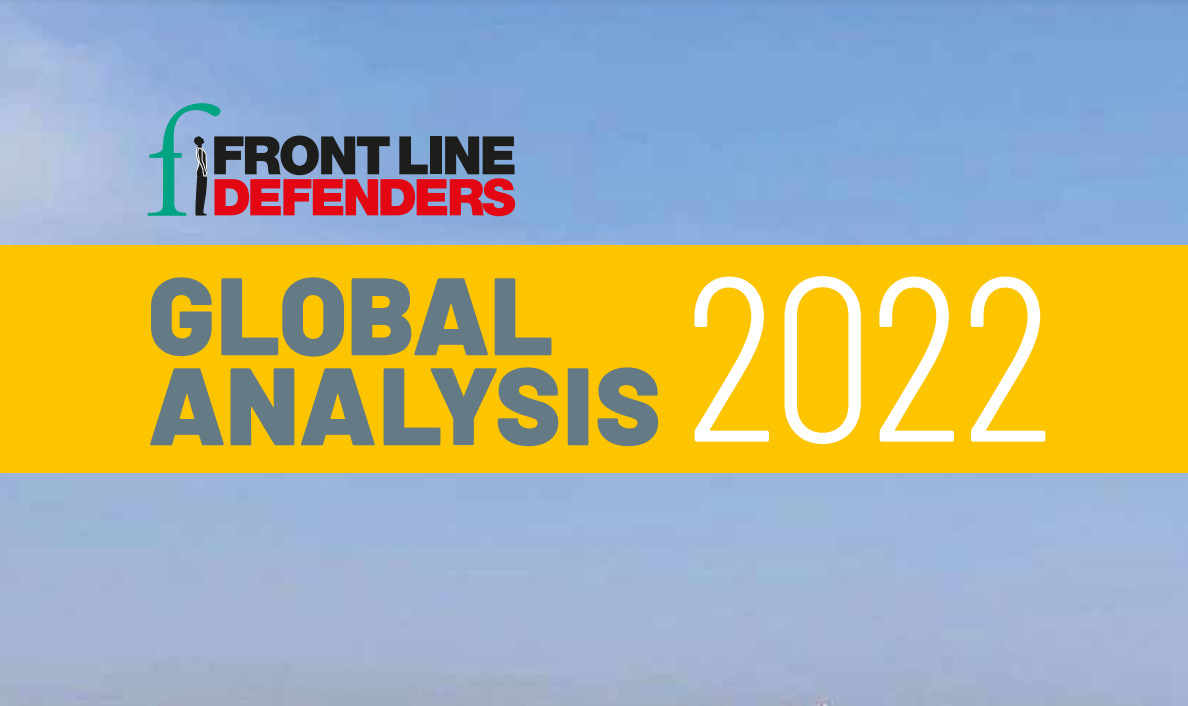Front Line Defenders 2022 report: Human rights defenders show remarkable courage in the face of attacks and killings Document
At least 401 defenders were killed in 26 countries for their peaceful work in 2022, reports human rights organization Front Line Defenders.
Despite an assault on human rights and the rule of law in many countries, human rights defenders (HRDs) showed remarkable courage and persistence in advocating for more democratic, just, and inclusive societies in 2022. Front Line Defenders’ Global Analysis 2022 gives a panorama of the threats faced by HRDs in all regions of the world.
The report also names 401 HRDs killed in 26 countries in 2022 – based on statistics by the HRD Memorial, a collective initiative of human rights organizations working to collect and verify data on the killings of HRDs each year.
“In a grim milestone, for the first time we saw more than 400 targeted killings of human rights defenders in 2022. While Latin America remained the deadliest region in the world for human rights defenders, we also saw a more dangerous landscape for defenders in the context of Russia’s full-scale invasion of Ukraine,” said Olive Moore, Interim Director of Front Line Defenders.
Increase in targeted killings
In 2022, the HRD Memorial investigated and verified the killings of 401 HRDs in 26 countries – compared to 358 HRDs killed in 35 countries in 2021. Five countries – Colombia, Ukraine, Mexico, Brazil, and Honduras – accounted for over 80% of killings, according to HRD Memorial data.
In the context of Russia's full-scale invasion of Ukraine, defenders engaged in humanitarian response and human rights journalists were also specifically targeted, with at least 50 documented killings by Russian military forces.
Wide array of threats
Global Analysis 2022 data is based on more than 1,500 threats and violations reported to Front Line Defenders, and is disaggregated by region, type of threat, sector of human rights work, and gender. The main threats HRDs reported to Front Line Defenders in 2022 included: arrest or detention (19.5%); legal action (14.2%); physical attack (12.8%); death threats (10.9%); and surveillance (9.6%).
Women on the front lines of conflicts and crises
Women human rights defenders (WHRDs) and their movements played a critical role in countering the onslaught against human rights in 2022. Throughout the year, in many countries including Afghanistan, the DRC, El Salvador, Iran, Myanmar, Sudan, and Ukraine, WHRDs continued to mobilize against and denounce the most repressive authoritarian regimes and occupying forces. For this, they paid a heavy and gendered cost, including attacks against them and their families, online smear campaigns and defamation, sexual violence, and other violations impacting their mental health and well-being.
Rampant criminalization of HRDs
Taken as a broader trend, criminalization of HRDs – in the form of arrest, detention, and legal action – was the most prominent form of attack seen in the data, comprising over a third (34%) of all violations. The widespread and arbitrary use of counter-terrorism laws to detain and prosecute HRDs depleted their morale, capacities, and resources.
Although it took different forms in different countries, authorities in Belarus, India, Nicaragua, the Occupied Palestinian Territories, and Zimbabwe, among others, used counter-terrorism and other restrictive laws to subject defenders and their organizations to repeated arrests, office raids, interrogations, threats of closure and actual shutdowns, among other tactics.
Globally, the most commonly cited legal charges against HRDs included: other criminal charges (21.8%); national/state security/sedition (19.0%); terrorism/membership or support of a terrorist organization (12.8%); defamation/Insulting state/damaging national unity (10.1%); and spreading fake news or rumors/propaganda (9.0%). Governments and private companies targeted HRDs with a range of digital threats. The most commonly cited were: internet/social media/website blockage (22.9%); online threat of violence/harassment (9.4%); confiscated devices computers/phones (8.7%); physical surveillance (8.3%); and doxxing (8.3%).
Situation in Belarus
Resorting to the same tactics used repeatedly since 2020 to crack down on civil society, the Belarusian government targeted and criminalized HRDs, primarily by abusing the judicial system to pursue repeated arrests, detentions, and trumped-up charges against them.
The WHRD Nasta Loika faced continuous retaliation for her work responding to repressive “anti-extremist” laws and protecting migrants and stateless peoples’ rights. Between September and December, she was subjected to six periods of 15-day administrative detention based on “petty hooliganism” charges, before being transferred to pre-trial detention on 24 December, where she faced charges under various articles of the Criminal Code. She reported being subjected to torture and inhuman treatment during her administrative detention.
After two years of being held in deplorable conditions in pre-trial detention, Marfa Rabkova, the WHRD and member of the organization HRC Viasna, was sentenced to 15 years in prison in September in reprisal for her work documenting torture and other human rights violations during the 2020 protests.
Meanwhile, new trumped-up charges were filed in September against the three Viasna leaders Ales Bialiatski, Valiantsin Stefanovic, and Uladzimir Labkovich, arbitrarily detained since July 2021. Their trials have been marred by multiple violations of human rights and fair trial standards.
Files
- 1535_fld_ga23_web.pdf (4.92 Mb)


















